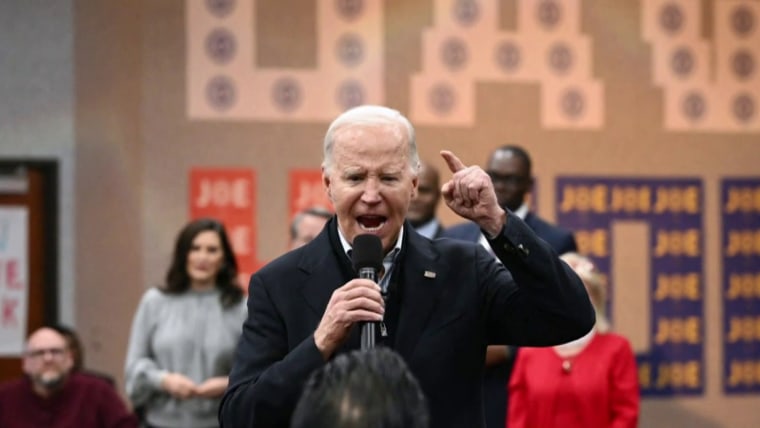In 1999’s “Being John Malkovich,” John Cusack, a puppeteer, takes a new job in an office on the 7½ floor of a New York City office building where he discovers a door that provides him a portal into the mind of actor John Malkovich.
The low ceiling means those on the 7½ floor must walk hunched over. That image gives us the single best description of Donald Trump’s 2024 presidential campaign. Trump has a high floor, but he will have a difficult time winning the White House again if he can’t raise his ceiling. So far, he’s not even trying to do that.
Trump has a high floor, but he will have a difficult time winning the White House again if he can’t raise his ceiling.
Trump’s floor of support is unusually robust. During his presidency, Trump’s approval ratings rarely fluctuated much. According to Gallup, Trump’s average approval rating when he was president was 41%. The lowest it ever hit was 34%; the highest was 49%, which he matched on a few occasions during the early stages of the Covid pandemic.
No matter what Trump did or said, for four years, the numbers rarely budged, with around 40% of the electorate consistently in his pocket. In his two bids for president, the story was slightly better but still consistent. He won 46.1% of the popular vote in 2016 and 46.8% in 2020.
In one respect, this is a huge asset for Trump. He can rely on a strong foundation of popular support.
But the downside is Trump’s ceiling. Indeed, Trump is the only president in modern history whose approval rating in the Gallup Poll never cracked 50%. If a politician never rises above an approval rating in the 40s, then it’s usually true more than half of the electorate disapproves of him.
Indeed, right now, Trump is more popular among the American people than he has been in years — and he’s still at 43% approval and 52% disapproval.
This is the crux of Trump’s current political dilemma. No matter how many polls show him edging out President Joe Biden, he is a candidate with a firm ceiling of popular support.

Even the most recent New York Times/Siena College poll, which shows him beating Biden by 4 points, bears this story out. In 2020, he won 50% of male voters and 44% of women. The Times poll this week has him at 49% and 46% respectively. In 2020, he won 92% of Republicans; now he’s winning 91%. In 2020, he won 55% of white voters; now he’s at 53%.
Similarly, a recent NPR/Marist poll that had Biden leading Trump by 1 point had nearly identical numbers — with Trump also at 49% and 46% respectively among men and women, at 53% among whites and winning 93% of GOP voters.
Obviously, there will be fluctuations in the numbers, and a poll in March doesn’t tell us what the electorate will do in November. But it’s still clear that Trump’s support remains relatively static — as has largely been the case since 2017.
For him to win in 2024, he will likely need to raise his ceiling, but, if anything, he’s lowering it further.
Trump seems inclined to run the same MAGA playbook that led him to defeat in 2020.
Last week, he declared that moderate Republicans, such as Sen. Mitt Romney of Utah, are no longer welcome in the MAGA-dominated GOP. Based on his few policy proclamations — ever harsher tactics to stem illegal immigration, including mass deportations; even more outrageously racist statements; an unerringly consistent obsession with the 2020 election; and a still extreme position on abortion — Trump seems inclined to run the same MAGA playbook that led him to defeat in 2020.
He has made no effort to offer a conciliatory peace offering to his last primary rival, former South Carolina Gov. Nikki Haley. Indeed, after her victory in Sunday’s Washington, D.C., primary — the first win ever for a woman in a Republican primary — he took to Truth Social to mock her with the nickname “Birdbrain” and call her a “loser.” This outburst came a week after an NBC News report suggested Trump’s aides are begging him to shelve his never-ending personal grievances and focus on actual policy issues.

The results of his MAGA-or-nothing strategy are being borne out on the campaign trail. In the recent Michigan primary, which Trump won handily, he nonetheless underperformed across the board in the affluent suburban districts where Republicans have been bleeding support for eight years. His best results came in poor, rural counties, which have become the bedrock of the Trump base but, with a diminishing and aging population, offer little opportunity for growth.
Indeed, one of the key questions going into Super Tuesday is whether Trump continues to lose suburban voters to Haley. Many of her supporters have told exit pollsters they won’t vote for Trump in the fall.
One of the key questions going into Super Tuesday is whether Trump continues to lose suburban voters to Haley.
It’s possible, of course, that Trump can run back his 2020 strategy and win this time, but that works only if Biden’s supporters stay home or switch sides. If Democrats eventually “come home” to Biden and unite against another Trump term in office, then the former president will need to win over a large enough segment of the electorate to make up his losing margin in 2020.
So far, there is no indication that Trump is willing or able to do that. The “Being John Malkovich” candidate remains ... stuck in his own head.

